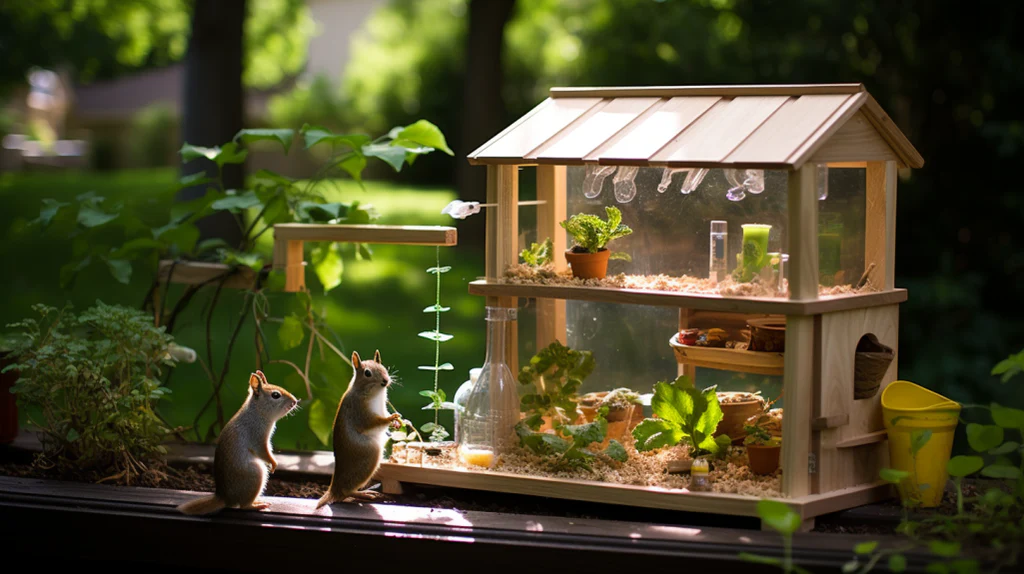If you’ve ever stepped outside only to find a squirrel rummaging around your porch, you’re not alone. Many homeowners wonder, why do squirrels go onto your porch in the first place? These small creatures are curious, adaptable, and always on the hunt for food, safety, or a cozy nesting spot. While they may look harmless, their visits can lead to property damage, health concerns, and even conflicts with pets.
In this guide, we’ll dive deep into squirrel behavior, explore the reasons they’re attracted to porches, examine the potential problems they cause, and give you practical tips to keep them away without harming them.
Introduction to Squirrel Behavior
Squirrels are clever and opportunistic animals that thrive in both wild and urban settings. They adapt quickly to human environments because porches, decks, and gardens often provide easy access to the essentials they need: food, shelter, and safety.
A porch is like a supermarket aisle for a squirrel. Food crumbs, birdseed, or even a bowl of pet food can lure them in. On top of that, porches often offer nooks, shade, and warmth that make them feel secure. To fully understand why squirrels visit, it helps to break down their instincts and needs.
Common Reasons Squirrels Go Onto Your Porch
Food Sources Around the Porch
One of the biggest answers to why squirrels go onto your porch is food. Like all animals, squirrels follow their stomachs.
Common porch food attractions include:
- Bird feeders spilling seeds onto the ground
- Pet food left in bowls outdoors
- Crumbs or food scraps from outdoor meals
- Garbage bins that aren’t tightly sealed
- Potted plants or flowers they like to nibble on
Once squirrels discover a consistent food source, they’ll keep coming back. In fact, they’re known for their memory skills, storing mental maps of food-rich areas for later visits.
Shelter and Safety
Porches often provide a safe refuge. Unlike open yards, a porch offers:
- Shade in the summer
- Protection from rain and snow
- Nooks and crannies to hide from predators like hawks or owls
This is especially true if your porch is partially enclosed or cluttered with boxes, furniture, or firewood piles. For a squirrel, these features make it the perfect temporary hideout.
Nesting Opportunities
Another big reason squirrels go onto porches is nesting. They may gather materials such as:
- Leaves and twigs from potted plants
- Insulation or fabric scraps left outside
- Wood shavings from chewed porch furniture
Sometimes, they even build nests right under the porch if they find an entry point. Female squirrels in particular look for secure, sheltered areas when raising young.
Curiosity and Exploration
Squirrels are naturally curious. Even without food or nesting materials, they may wander onto your porch simply to explore. Their playful and investigative behavior often leads them into human spaces. For instance, a squirrel might climb onto your porch railing out of sheer curiosity about the smells, colors, or noises coming from inside.
Signs Squirrels Are Visiting Your Porch
You may not always catch them in the act. Still, squirrels leave behind telltale signs of their visits:
- Droppings scattered near furniture or steps
- Chewed wood, cushions, or wires
- Scratched surfaces on posts or flooring
- Disturbed plants with dug-up soil
- Noises like scampering, scratching, or chattering
Case Example: A homeowner in Minnesota noticed small teeth marks on their wooden rocking chair. After setting up a motion-activated camera, they discovered squirrels chewing the furniture daily, likely to sharpen their teeth and gather wood fibers for nests.
Potential Problems When Squirrels Visit Your Porch
Although squirrels look cute, frequent porch visits can lead to several challenges.
Property Damage
Squirrels have strong teeth that never stop growing, so they constantly gnaw to keep them filed down. This results in:
- Chewed porch railings and wooden furniture
- Damaged cushions or fabric covers
- Gnawed electrical wires (posing fire risks)
Health Concerns
Squirrel droppings may carry bacteria or parasites that are unsafe for humans and pets. While they’re not as dangerous as some rodents, their presence can still pose hygiene issues.
Safety Risks for Pets
Cats and dogs are naturally curious about squirrels. If your pet encounters one on the porch, it could result in scratches, bites, or unnecessary stress for both animals.
How to Prevent Squirrels From Going Onto Your Porch
Prevention is the best approach. Here are proven strategies to keep squirrels away:
Remove Food Sources
- Bring pet food inside after meals
- Sweep up crumbs after eating outdoors
- Use squirrel-proof bird feeders with baffles or cages
Secure Your Porch
- Seal cracks, gaps, or openings under the porch
- Store items like firewood or boxes away from the area
- Use wire mesh to block entry points beneath steps
Natural Deterrents
Squirrels dislike strong smells. Consider these natural repellents:
- Peppermint oil
- Vinegar sprays
- Cayenne pepper or chili flakes sprinkled around problem spots
Humane Repellents
Modern devices provide safe ways to deter squirrels:
- Motion-activated sprinklers startle them away
- Ultrasonic devices emit sounds unpleasant to rodents but inaudible to humans
Humane Ways to Coexist With Squirrels
You don’t need to view squirrels as enemies. In fact, there are humane ways to live alongside them without constant porch invasions:
- Create feeding stations farther away in your yard, so squirrels have their own spot
- Encourage natural predators like owls or hawks by installing nesting boxes
- Educate neighbors to avoid leaving out food, since squirrels will roam between yards
Remember, removing squirrels entirely isn’t realistic they’re part of the ecosystem. The goal is to redirect their attention away from your porch.
FAQs About Squirrels on Porches
Why do squirrels chew porch wood?
They gnaw to keep their teeth sharp and may also use wood shavings for nesting.
Will squirrels eventually leave on their own?
Not if they’ve found consistent food or shelter. You’ll need to take preventative measures.
Are squirrels dangerous to humans?
Generally no, but they may bite if cornered, and droppings can spread germs.
What’s the difference between a porch visit and an infestation?
Occasional visits are normal. Daily damage or nests built on your porch may indicate a bigger problem.
Conclusion
So, why do squirrels go onto your porch? The simple answer is food, shelter, and curiosity. They’re opportunistic creatures that see porches as easy resources for survival. While their visits can be charming at first, they often lead to chewed furniture, hygiene concerns, or pet conflicts.
To solve the issue:
- Eliminate food sources
- Secure entry points
- Use natural or humane deterrents
- Provide alternative spaces away from your porch
By understanding squirrel behavior and using preventive measures, you can enjoy your porch in peace while coexisting humanely with these energetic little animals.

